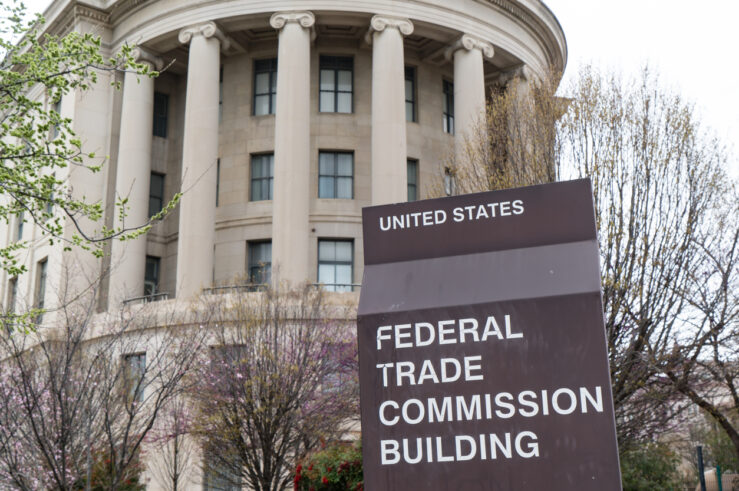Showing results for: “FTC policy statement unfair methods of competition”
FTC v Amgen: The Economics of Bundled Discounts, Part Two
The Federal Trade Commission (FTC) recently announced that it would sue to block Amgen’s proposed $27.8 billion acquisition of Horizon Therapeutics. The challenge represents a landmark in the history of pharmaceutical-industry antitrust enforcement, as the industry has largely been given license to engage in permissive mergers and acquisitions of smaller companies without challenge. In Part One, ... FTC v Amgen: The Economics of Bundled Discounts, Part Two
FTC Rulemaking Under UMC Could Mean Return of the National Nanny
The Federal Trade Commission (FTC) has been in the antitrust-enforcement business for more than 100 years. Its new leadership is considering some of the biggest changes ever in its enforcement methods. Instead of a detailed analysis of each case on its own merits, some FTC leaders now want its unelected bureaucrats to write competition rules ... FTC Rulemaking Under UMC Could Mean Return of the National Nanny
Antitrust at the Agencies Roundup: You Will Absolutely Work in This Town Again Edition
I mean, Alvaro. I know it was you, Alvaro. Readers might recall my recent discussion of the Federal Trade Commission’s (FTC) new Bureau of Let’s Sue Meta, in which I covered, among other things, the commission’s proposal to modify its 2020 Decision and Order In the Matter of Facebook Inc. (now Meta). The 2020 order ... Antitrust at the Agencies Roundup: You Will Absolutely Work in This Town Again Edition
An ambitious AG, a disgruntled competitor, and the contrived antitrust case against Google in Missouri
The populists are on the march, and as the 2018 campaign season gets rolling we’re witnessing more examples of political opportunism bolstered by economic illiteracy aimed at increasingly unpopular big tech firms. The latest example comes in the form of a new investigation of Google opened by Missouri’s Attorney General, Josh Hawley. Mr. Hawley — ... An ambitious AG, a disgruntled competitor, and the contrived antitrust case against Google in Missouri
Net Neutrality and Broken Records
I don’t mean to sound like a broken record, but why is the Federal Communications Commission (FCC) playing a broken record? I’ve been writing a fair bit about Federal Trade Commission (FTC) rulemaking initiatives. On the theory that you deserve a nominal break from all of that, this post is mostly about the FCC. On ... Net Neutrality and Broken Records
FTC Proposes Rule Deeming Non-Compete Clauses to be Unfair Methods of Competition
On Jan. 5, 2023, the Federal Trade Commission (FTC) issued a Notice of Proposed Rulemaking (NPRM) to prohibit employers from entering non-compete clauses with workers.[1] The proposed rule would extend to all workers, whether paid or unpaid, and would require companies to rescind existing non-compete agreements within 180 days of publication of the final rule.[2] ... FTC Proposes Rule Deeming Non-Compete Clauses to be Unfair Methods of Competition
The Final Order in the FTC’s Google standard-essential patents case and the continuing danger to standard-setting
On July 24, the Federal Trade Commission issued a modified complaint and consent order in the Google/Motorola case. The FTC responded to the 25 comments on the proposed Order by making several amendments, but the Final Order retains the original order’s essential restrictions on injunctions, as the FTC explains in a letter accompanying the changes. ... The Final Order in the FTC’s Google standard-essential patents case and the continuing danger to standard-setting
Congressional testimony on legislative reform proposals for the FTC
Earlier this week I testified before the U.S. House Subcommittee on Commerce, Manufacturing, and Trade regarding several proposed FTC reform bills. You can find my written testimony here. That testimony was drawn from a 100 page report, authored by Berin Szoka and me, entitled “The Federal Trade Commission: Restoring Congressional Oversight of the Second National Legislature — An ... Congressional testimony on legislative reform proposals for the FTC
Reflections on the recent filings in Qualcomm/FTC dispute
On Monday, the U.S. Federal Trade Commission and Qualcomm reportedly requested a 30 day delay to a preliminary ruling in their ongoing dispute over the terms of Qualcomm’s licensing agreements–indicating that they may seek a settlement. The dispute raises important issues regarding the scope of so-called FRAND (“fair reasonable and non-discriminatory”) commitments in the context ... Reflections on the recent filings in Qualcomm/FTC dispute
Experts’ Report Proposes Greater Coordination of U.S. Competition Law and Trade Law Policies
On March 14, the U.S. Chamber of Commerce released a report “by an independent group of experts it commissioned to consider U.S. responses to the inappropriate use of antitrust enforcement actions worldwide to achieve industrial policy outcomes.” (See here and here.) I served as rapporteur for the report, which represents the views of the experts ... Experts’ Report Proposes Greater Coordination of U.S. Competition Law and Trade Law Policies
FTC UMC Rulemakings Would Prove Legal Failures
Federal Trade Commission (FTC) competition rulemakings, like spring, are in the air. But do they make policy or legal sense? In two commentaries last summer (see here and here), I argued that FTC competition rulemaking initiatives would not pass cost-benefit muster, on both legal grounds and economic policy grounds. As a legal matter, I stressed ... FTC UMC Rulemakings Would Prove Legal Failures
Competition Increases Concentration
A market with 1,000 tiny sellers is not some ideal market. Concentration can be extremely beneficial, leading to economies of scale and stiffer competition to win a big share of the market. Yet the Federal Trade Commission (FTC) and U.S. Justice Department’s (DOJ) draft merger guidelines double down on the idea that concentration is inherently a problem. ... Competition Increases Concentration








